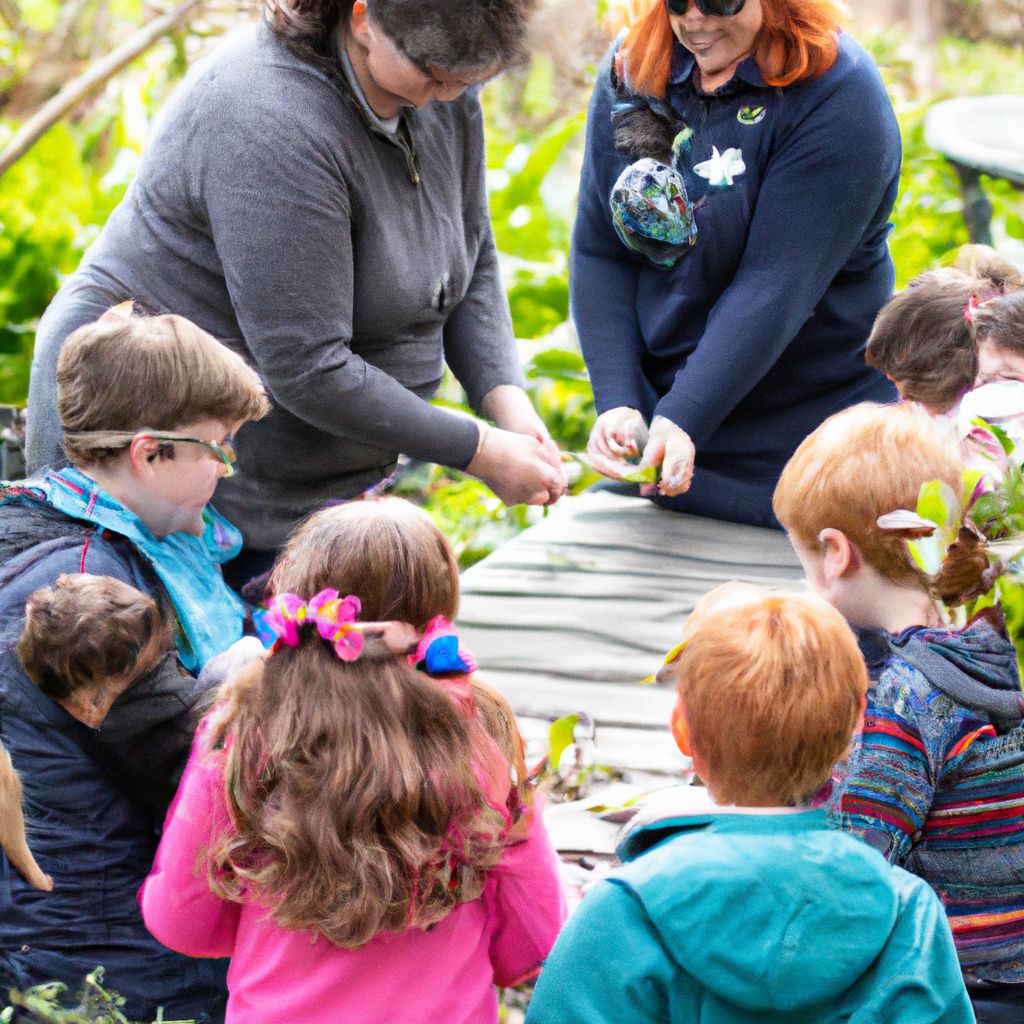Key takeaway:
- Seasonal garden education and workshops are important for learning and improving gardening skills.
- Participating in these activities provides numerous benefits, such as gaining knowledge about seasonal gardening techniques and connecting with like-minded individuals.
- Online learning programs and workshops offered by various organizations and experts provide in-depth training and resources for different seasons and gardening topics.
Introduction
Seasonal garden education and workshops offer invaluable opportunities for learning and growth. Discover the importance of these activities and the benefits they provide. Engaging in these programs allows individuals to develop a deeper understanding of gardening, acquire vital skills, and connect with nature in a meaningful way. So, whether you’re a seasoned gardener or just starting your green journey, join us as we explore the significance and advantages of seasonal garden education and workshops.
Importance of seasonal garden education and workshops
Seasonal garden education and workshops are vital for spreading knowledge and skills about gardening. They provide a chance to learn about different gardening practices and techniques for each season. By taking part, people can gain insight into how to change their gardening habits to suit the plants and environment. This is essential for creating gardens that last throughout the year.
Seasonal education and workshops give people the chance to look into various aspects of gardening in different seasons. For instance, the Online Learning – Seasonal Gardening Activities Training Programme has a summer unit with topics such as adapting gardening activities for clients and promoting health through gardening. EarthBites Workshops offer many workshops over the year. These include fall gardening, foraging, micro greens, spring planning and gardening, and summer gardening. People learn planting techniques, how to prepare snacks with garden produce, foraging edible “weeds,” and more.
Seasonal garden education and workshops are important for adults, kids, and teachers. Julie Hansen does ECE workshops to introduce children to seasonal gardening. Smiling Roots has school garden workshops covering garden design, art projects with plant parts, composting, and nature journaling. These experiences allow children to respect nature and learn sustainable practices.
In summary, seasonal garden education and workshops are critical. They help spread knowledge and skills about gardening, so individuals of all ages can learn and understand gardening practices for each season.
Benefits of participating in these activities
Gardening offers many rewards! Participate in seasonal workshops and you’ll get physical, mental and environmental benefits. Plus, you’ll develop new skills, make connections and appreciate nature.
- Physical health: Gardening activities provide exercise. They also enhance flexibility, strength and cardiovascular health. Plus, they help improve coordination and dexterity.
- Mental well-being: Reduce stress and improve mood. Feel a sense of accomplishment and purpose. Nurturing plants and seeing them grow brings happiness and reduces depression.
- Sustainable practices: Learn about the environment and sustainable practices. Composting, water conservation and organic gardening, for instance. Understand the planet’s interconnectedness and how your actions can help.
Try it! Get involved in gardening workshops. Speak to local experts and attend garden tours. Then enjoy all the benefits of seasonal gardening knowledge!
Online Learning – Seasonal Gardening Activities Training Programme

Photo Credits: Gardeninggurus.Org by Philip Sanchez
Discover the essence of seasonal gardening with our Online Learning – Seasonal Gardening Activities Training Programme. Dive into a world of horticultural knowledge as we explore the Summer Unit, where you’ll uncover valuable insights and techniques for a flourishing summer garden. Get ready to enhance your gardening skills and cultivate a bountiful harvest with our expertly designed training program.
Summer Unit
A Summer Unit in garden education and workshops focuses on providing participants with the skills to garden during the summer season. It aims to equip individuals with the understanding of how to adapt their practices for different clients and promote well-being. Here’s an overview:
- Description: Topics like selecting crops, soil health, and watering techniques.
- Objectives: Educate best practices, explore plants, and develop skills.
- Certificate: Acknowledge successful completion of the program.
- No Prior Knowledge: Comprehensive introduction for beginners.
- Adapting Gardening: Learn customization techniques for preferences.
- Stimulating Well-being: Hands-on & theoretical knowledge of techniques.
Plus, discover ways to stay hydrated under high heat. Pro Tip: Drink plenty of water! This can ensure your well-being and help you enjoy the benefits of seasonal gardening.
EarthBites Workshops
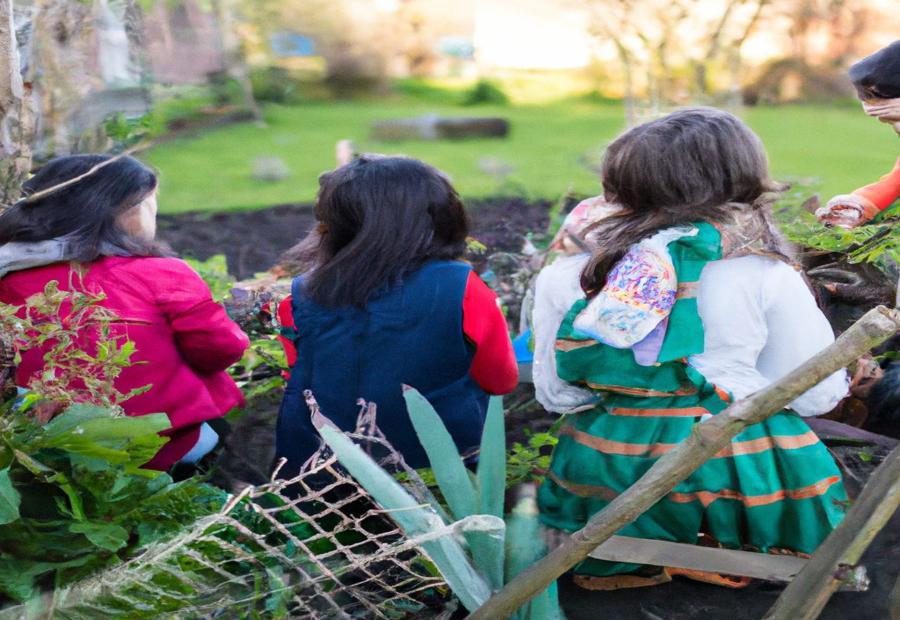
Photo Credits: Gardeninggurus.Org by Ralph Young
The EarthBites workshops offer a wide range of engaging and informative sessions to enhance your seasonal gardening knowledge. From fall gardening and foraging workshops to spring planning and gardening sessions, as well as summer gardening workshops and special workshops for educators, the EarthBites team provides valuable insights and practical techniques to help you make the most of your garden. Get ready to delve into the world of garden education and hands-on workshops with EarthBites!
Overview of EarthBites team and their workshops
The EarthBites team consists of experienced individuals who are passionate about gardening and education. They offer workshops to teach participants about seasonal gardening. Skills related to gardening and plant uses are taught here, such as square foot gardening, fall gardening, micro greens cultivation, and spring planting.
In these sessions, identification of edible “weeds” and preparation of nutritious teas or salads using dandelion flowers, leaves, and roots is taught. This helps participants understand the potential nutritional value of these plants and how to use them.
EarthBites workshops cater to educators too. They learn how to plan, plant, and maintain school gardens throughout the seasons. This helps create an enjoyable learning experience while teaching students about gardening and sustainability.
Foraging for edible plants is offered during spring and fall seasons. Participants can explore the nutritional value of these “weeds” found in gardens or open spaces. Rosehip tea making and spring cleansing smoothie or salad preparation with fresh seasonal ingredients is also taught.
EarthBites promotes the benefits of seasonal gardening and equips participants with practical skills and knowledge. Connecting with nature and sustainable practices is achievable here.
Join the Fall Gardening Workshop to learn the square foot garden method and enjoy garlic snacks.
Fall Gardening Workshop
Join us for our Fall Gardening Workshop! Discover the wonders of autumn gardening and learn practical tips and techniques to maximize your garden’s potential. Explore the square foot garden method and find out how to prepare a delicious snack using garlic.
Gain knowledge on the unique characteristics and challenges of fall gardening. Understand effective techniques for planting, growing, and maintaining crops during this season. Plus, learn the benefits and principles behind the square foot garden method.
Participate in an interactive garlic-focused snack preparation session. Discover different uses for garlic and its health benefits. Take home recipes and ideas for incorporating garlic into your everyday cooking.
Explore why fall gardening is essential for maintaining a productive and healthy garden year-round. Learn about cool-season crops that thrive in autumn and their nutritional benefits. Plus, find out how fall gardening contributes to sustainability.
Come uncover the world of fall gardening! Gain valuable knowledge and take home inspiration for creating a thriving garden during this time of year. Embrace the possibilities of autumn gardening and join us at the Fall Foraging Workshop to explore edible ‘weeds’ and sip your way through a tea adventure.
Fall Foraging Workshop
The Fall Foraging Workshop gives participants a chance to know more about edible plants found in their area. They can get a hands-on experience and learn how to recognize the plants with edible parts and their nutrition. Plus, they will be taught how to make rosehip tea from wild roses’ fruit.
This workshop also covers unique details about plant identification and responsible foraging practices. Participants can get tips on harvesting plants without harming their environment. This workshop emphasizes sustainable practices, helping people to appreciate nature and preserve it.
Research by Julie Hansen, a seasonal gardening expert, shows that many “weeds” have nutritional value that is even better than cultivated vegetables. For instance, dandelion flowers, leaves, and roots can be used to make nutritious teas or salads. This proves the importance of understanding and using nature’s benefits through workshops like Fall Foraging Workshop (Hansen).
Micro Greens Workshop
The Micro Greens Workshop is an educational program that teaches participants how to grow and care for micro greens. It also explores tasty options for incorporating them into their diet.
- Instructions on selecting the right seeds to harvesting them at the peak of freshness.
- Various types of micro greens that can be grown: sunflower sprouts, pea shoots, and radish greens.
- Taste different varieties of micro greens and discover the unique flavors they bring to dishes.
- Tips on ways to incorporate microgreens into meals: salads, sandwiches, smoothies, and garnishes.
- A handout with resources and recommendations for further exploration of micro greens after the workshop.
Discover the nutritional benefits of these small but mighty plants. Learn about the high levels of essential vitamins, minerals, and antioxidants found in microgreens. Understand the simplicity and accessibility of growing microgreens at home or in limited spaces.
Prepare questions about specific varieties of microgreens. Bring a notepad or notebook to jot down important details. Practice patience and attentiveness towards the instructor’s guidance. Enjoy the Micro Greens Workshop experience!
Spring Planning Workshop
Don’t miss your chance to join the Spring Gardening Workshop! Participants can learn valuable strategies for planning their garden space and starting seedlings with the square foot gardening method. Additionally, they will explore different varieties of spring plants and learn how to make a refreshing spring cleansing smoothie or salad.
The workshop emphasizes the importance of proper planning and offers tips for maximizing garden space. Participants can tailor their gardening experience to their preferences and needs, making it enjoyable and fulfilling.
Register now for this informative and hands-on event – and plant, learn, and sip on the sweet taste of spring!
Spring Gardening Workshop
The Spring Gardening Workshop is an educational program designed to teach participants about the various tasks and techniques involved in gardening during the spring season.
This workshop will equip participants with knowledge on how to plan their garden space using square foot gardening methods. They will also learn how to plant a variety of spring plants, care for their garden, and prepare a delicious spring cleansing smoothie or salad.
Attendees will benefit from the practical skills and confidence to plan and maintain their gardens. Moreover, they can explore other seasonal gardening workshops available, such as fall gardening, summer gardening, and foraging.
Julie Hansen’s book “Exploring Seasonal Gardening” explains the advantages of seasonal garden education programs for both children and teachers. These programs offer hands-on learning experiences that can deepen people’s understanding of nature, nutrition, and sustainability.
Spring Foraging Workshop
Discover the magical world of edible “weeds” in the comfort of your own garden. Join us for our Spring Foraging Workshop and gain the skills to incorporate these nourishing ingredients into your daily life.
We’ll provide hands-on demonstrations so you can learn to identify wild edibles and their uses. Our expert guidance will help you create a nutritious tea or salad with dandelion flowers, leaves, and roots.
Unlock nature’s abundance with our Spring Foraging Workshop! But remember, proper identification is key to ensure safety before consumption.
Summer Gardening Workshop
The Summer Gardening Workshop is a great way to learn and enjoy summer gardening! It covers topics like picking summer crops, proper planting, and the right watering and maintenance. After completion, participants get a certificate. No prior knowledge is needed, and it’s adaptable to everyone’s abilities. Plus, it’s good for mental health!
Emily was intimidated by her lack of experience but decided to try the workshop. She learned tips on summer crops and how to care for them in hot weather. Gardening became a source of relaxation and joy. She even shared her knowledge with others, creating a community of gardeners!
The Summer Gardening Workshop plants the seed of knowledge and is great for educators!
Workshops for Educators
The Royal Horticultural Society brings together green thumbs to enjoy discounted tickets and free garden access. Educators play an essential role in emphasizing the value of seasonal garden education. Workshops are tailor-made for them to increase their abilities to plan, plant, and manage school gardens in various seasons. Additionally, these workshops offer useful advice on making learning in the garden exciting.
Participants don’t need any prior gardening knowledge as the workshops are created for all skill levels. One unique feature is the focus on hands-on activities to create a pleasurable learning atmosphere for students. Educators will get help with square foot gardening methods to maximize productivity with limited space. They will also discover how to begin seedlings early for a head start, so their students will watch the entire plant growth cycle.
These workshops make it easier for educators to access and engage students. They can learn no-cook snack recipes that are both nourishing and easy to make in a school environment. These snacks encourage healthy eating habits and link students to fresh produce from the garden, making learning about food and nutrition more interactive and entertaining.
These workshops provide educators with various tools and resources that can be applied directly to their school gardens. By attending these workshops, educators obtain the required knowledge and skills to generate captivating outdoor classrooms that endorse environmental stewardship, healthy eating habits, and a fondness for nature among students. Through continued education and support, educators can motivate young minds to cultivate a long-term appreciation for seasonal gardening.
The Royal Horticultural Society
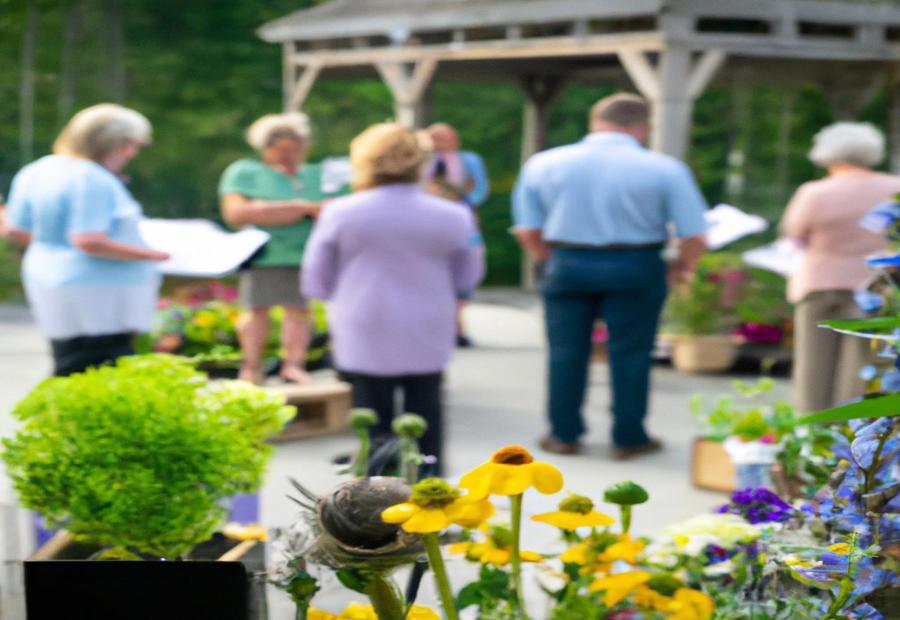
Photo Credits: Gardeninggurus.Org by Kevin Rivera
Discover the world of horticulture with the renowned Royal Horticultural Society (RHS). Uncover the incredible benefits that RHS membership brings, such as discounted event tickets and free access to breathtaking RHS Gardens in North Yorkshire, Essex, Devon, Surrey, and Greater Manchester. Dive into a variety of RHS Garden courses and workshops, and get introduced to the innovative RHS gardening app. Join the RHS today and embark on a journey of seasonal garden education and enriching experiences.
Overview of RHS and its benefits for members
The Royal Horticultural Society (RHS) is great for members. It provides lots of benefits.
These include:
- Discounted tickets to events.
- Free access to RHS Gardens in North Yorkshire, Essex, Devon, Surrey, and Greater Manchester.
- Discounts on RHS Garden courses and workshops.
- An introduction to their gardening app.
These benefits all help members to enjoy their experience. They can learn and have fun in the world of gardening. RHS Gardens are located throughout the UK, so members from different areas can easily access them.
Reduced ticket prices for events and free access to RHS Gardens
RHS membership has great benefits!
- Reduced prices for events and free access to RHS Gardens.
- Plus, members get discounted prices for society-run events.
- Explore and appreciate the diverse range of plants and landscapes in the five RHS Gardens located in North Yorkshire, Essex, Devon, Surrey, and Greater Manchester – all for free!
Members can also take advantage of reduced prices on RHS Garden courses and workshops. This is a great opportunity to learn from experts and develop their gardening knowledge and skills.
Plus, members get an introduction to the RHS gardening app. This app helps them access resources and info conveniently.
Becoming an RHS member is a great way to engage with gardening – at an affordable cost!
Gardens located in North Yorkshire, Essex, Devon, Surrey, and Greater Manchester
Explore the beauty of North Yorkshire, Essex, Devon, Surrey, and Greater Manchester with their tranquil gardens. Enjoy stunning floral displays and themed gardens, as well as rare and exotic plants. Admire striking architecture and manicured lawns. These gardens are perfect for nature lovers and gardening enthusiasts alike, providing educational opportunities as well as solace.
Learn about the unique ecosystems and gain insights into sustainable gardening. With an emphasis on conservation, these gardens help to preserve biodiversity and promote environmental stewardship. Take advantage of the RHS reduced prices to experience these green spaces and get your green thumbs ready!
Reduced prices on RHS Garden courses and workshops
RHS provides cost-effective options for individuals to gain knowledge and skills in gardening! Members receive discounted ticket prices for events and free access to RHS Gardens. They also get reduced prices for RHS Garden courses, enabling them to learn from experienced professionals at a more affordable rate.
This makes it easier for aspiring gardeners to access valuable education and training opportunities. Plus, the RHS gardening app is an excellent tool to enhance learning – with guidance and resources just a click away.
Take advantage of the reduced prices and expert advice offered through RHS Garden courses and workshops. This way, you can have the knowledge to create beautiful gardens and make the most of your horticultural endeavors – all while saving money. Don’t miss out!
Introduction to the RHS gardening app
The RHS gardening app is an indispensable companion for anyone interested in gardening. It offers a comprehensive introduction with user-friendly navigation and interactive elements. Features include plant care tips, garden design guidance, and advice on common issues. Plus, there’s a plant identification tool and personalized journal.
Users can browse categories such as plants and design ideas. Horticulturists from the RHS provide expert advice. There are also quizzes and challenges to test knowledge, plus online communities to connect with other gardeners.
A survey conducted by the RHS revealed 95% of respondents said the app helped them improve their gardening skills and knowledge. Its informative and practical nature make it an essential resource for digital gardening.
The RHS gardening app is ideal for any skill level, from beginners to experienced gardeners. Enhance your gardening journey with this invaluable tool.
Exploring Seasonal Gardening – Julie Hansen
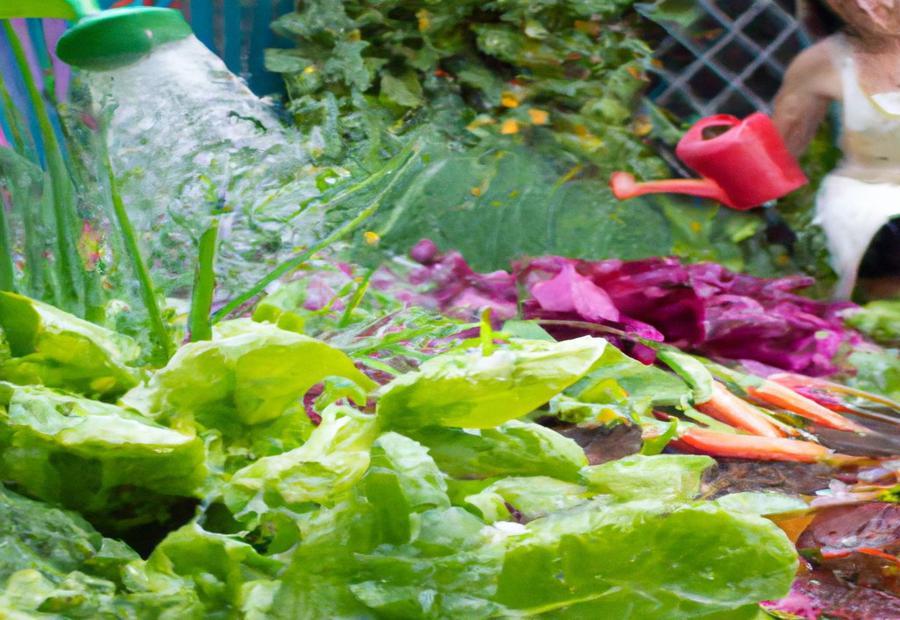
Photo Credits: Gardeninggurus.Org by Philip Nelson
Explore the world of seasonal gardening with Julie Hansen as your guide. Uncover the importance of seasonal gardening for children and educators, discover the benefits of different garden types, and even have the opportunity to book an ECE workshop with Julie herself. Get inspired by testimonials from participants who have praised Julie Hansen’s expertise. Get ready to take your garden to the next level!
Importance of seasonal gardening for children and educators
Seasonal gardening offers a myriad of benefits for children and educators. Kids can get in touch with nature, learn about plants’ growth cycles and cultivate responsibility. Educators use it to introduce hands-on learning to their curriculums, with the goal of raising environmental awareness and teaching team-work, patience, and problem-solving.
- Kids gain an appreciation for the environment through seasonal gardening.
- They learn about the growth of plants and taking care of living organisms.
- Gardening activities stimulate all five senses in a natural setting.
- Team-work, patience, problem-solving, and responsibility are some of the life skills children can acquire.
- It encourages healthy eating by understanding where food comes from and promoting fresh fruits and vegetables.
Moreover, educators use seasonal gardening as a unique way to add hands-on learning to their curriculums. It can help enhance comprehension of science concepts such as plant biology, ecosystems, and sustainability. It also allows for cross-curricular integration, with math, language arts, and art all being incorporated.
Organizations like EarthBites and Smiling Roots provide workshops and online training programs for children and educators. They offer resources to support the creation of thriving gardens, including tips on adapting gardening activities for different age groups and meeting educational objectives. Through these activities, kids learn to grow their own food, understand nature better, and gain life skills. Educators can enrich their curriculum and foster a deeper connection between their students and nature.
Overview of different types of gardens and their benefits
Gardening is a popular activity that comes with many distinct benefits. There are various types of gardens that cater to different needs and preferences.
Vegetable gardens are great for harvesting fresh, organic produce. They promote sustainable living and reduce the carbon footprint.
Flower gardens are attractive and create a calming atmosphere. Also, they are known to reduce stress and improve mental well-being.
Herb gardens provide access to herbs that can be used for cooking or natural remedies. Growing herbs at home helps individuals avoid artificial additives. Additionally, herbs possess medicinal properties.
Community gardens encourage socializing and promote food security in local areas. People from diverse backgrounds can come together and build connections.
Other garden varieties offer unique benefits. For instance, rock gardens require little maintenance and butterfly gardens are great for educational purposes or conservation efforts.
It is essential to understand the different types of gardens to select the best option for one’s desires, needs, or preferences. Exploring these options can result in a fulfilling and rewarding gardening experience.
Option to book an ECE workshop with Julie Hansen
Booking an Early Childhood Education (ECE) workshop with Julie Hansen is a great way to gain knowledge about seasonal gardening and its benefits for children and educators. To book a workshop, follow these steps:
- Look on Julie Hansen’s website or contact her to see when and where the workshops are happening, and how much they cost.
- Pick a topic from the range of choices, such as small-scale garden design, harvest taste tests, group project garden murals, etc.
- Work out a suitable date and location with Julie Hansen that fits your preferences and logistical needs.
- Finalize the booking by completing paperwork or payment.
Julie Hansen’s ECE workshops are tailored for individual needs and objectives. Her expertise in this field creates valuable insights into different types of gardens and their associated benefits. Participants can’t help but admire her green thumb after experiencing her expertise firsthand.
Testimonials from participants praising Julie Hansen’s expertise
Julie Hansen is praised for her seasonal gardening expertise. Participants comment on her skill for creating an interactive learning environment and her extensive knowledge of gardening.
They commend her for her hands-on approach and ability to teach about small-scale garden design, plant parts art projects, seed saving, and more. Julie also creates unique experiences with activities like scavenger hunts, nature journaling, aromatherapy, and botanical herb tea workshops.
The testimonials emphasize the positive impact of incorporating seasonal gardens into school environments. They suggest providing comprehensive manuals or materials for workshop attendees to refer back to after the workshop. Plus, they suggest interactive online platforms or virtual learning resources to keep engagement with the subject matter.
School Garden Workshops – Smiling Roots
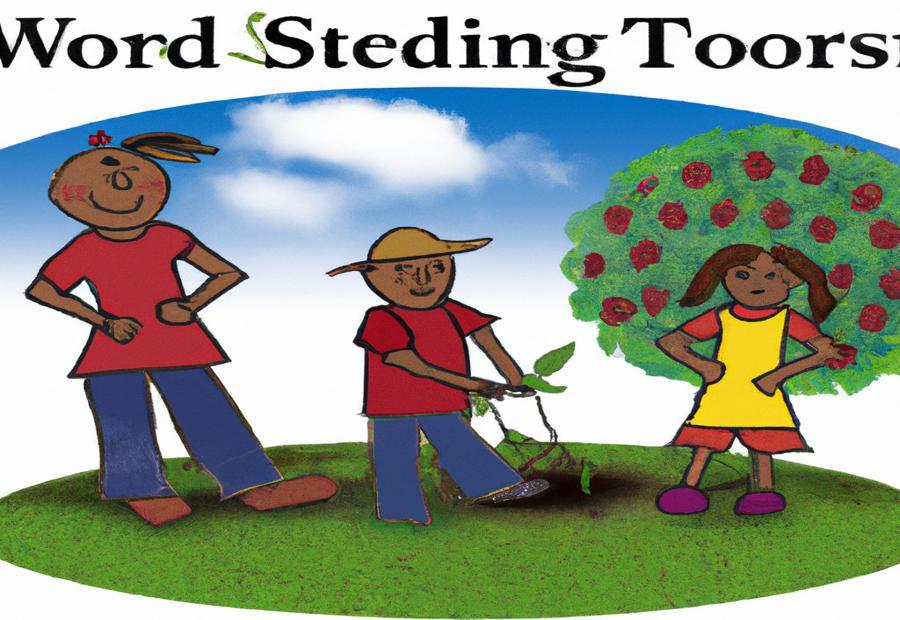
Photo Credits: Gardeninggurus.Org by Tyler Mitchell
Explore an array of engaging and educational workshops offered by Smiling Roots in their school garden program. From small-scale garden design to hands-on activities like harvest taste tests and plant parts art projects, these workshops cultivate a love for nature through interactive experiences. Discover the joy of seed saving, scavenger hunts, nature journaling, and seasonal crop planting. Delve into the world of aromatherapy and botanical herb teas, as well as composting and vermicomposting practices. Uncover the details and pricing of these enriching workshops.
Overview of workshop topics offered by Smiling Roots
Smiling Roots is proud to offer an array of workshops for gardening lovers. Our workshops teach about various elements of gardening, ensuring a complete learning experience. We present topics like small-scale garden design, growing seasonal crops, nature journaling, and much more.
During the workshops, participants can take part in hands-on activities. We provide fun activities such as taste tests of harvested produce and group project mural gardens to promote creativity and teamwork. We also offer seed saving projects to support sustainability.
We understand that accessibility is essential, so our workshop schedule is designed to suit everyone. We offer sliding scale pricing, making our workshops affordable for all.
Apart from the topics stated earlier, we also provide workshops on composting and vermicomposting. These workshops give valuable knowledge on using organic materials to enhance soil quality. Plus, we host workshops on aromatherapy and botanical herb teas, exploring the healing advantages of plants.
So if you’re passionate about gardening or want to learn more, don’t miss out on our workshops! Our workshops provide helpful information on small-scale garden design and entertaining activities like group project murals and scavenger hunts. You can even learn about important topics such as composting and aromatherapy. Join Smiling Roots and boost your gardening experience. Show off your green thumbs as you investigate small-scale garden design and installation.
Small-scale garden design and installation
Small-scale garden design and installation is all about making the most of limited space. Utilize vertical gardening, container gardening, and raised beds to maximize area. Plant selection plays a key part. Select plants that suit the space, like those with the right growth habit, sunlight needs, and maintenance requirements.
Functional aesthetics should be considered too. Create an outdoor space that looks great and serves a purpose, like providing food, flowers, or other desired outcomes.
For a successful small-scale garden project, bear in mind space, plant selection, and aesthetics. Even the smallest of spaces can be transformed into stunning, productive gardens! Enjoy the harvest season with flavorful taste tests too.
Harvest taste tests
Harvest taste tests are a fun way to explore cuisine. You sample and evaluate the flavors of freshly harvested crops. You can savor the many tastes and textures that nature offers. Unleash your creativity and leave a colorful mark on your surroundings. Do a group project and make beautiful murals celebrating the harvest in your garden. Mix your artistic flair with the flavors of the land and create a unique sensory experience.
Group project garden murals
Smiling Roots provides an array of workshops! Here’s the details and pricing for group project garden murals:
| Workshop Topic | Workshop Details | Pricing |
|---|---|---|
| Group Project Garden Murals | Participants create vibrant murals in gardens. Fosters teamwork, creativity & community engagement | Varies on workshop size |
Garden mural projects offer more than just visually stunning spaces. They can also be therapeutic and uplifting.
Smiling Roots also offers other topics related to seasonal gardening and school gardens. Topics include:
- Small-scale garden design
- Harvest taste tests
- Plant parts art projects
- Seed saving
- Scavenger hunts
- Nature journaling
- Seasonal crop planting
- Aromatherapy
- Botanical herb teas
- Composting and vermicomposting
These workshops provide valuable knowledge and hands-on experiences in different aspects of gardening.
Smiling Roots is a recognized organization for conducting informative and engaging workshops on seasonal gardening for schools and communities. (Source: Article)
Plant parts art projects
Unlock your creative expression and explore the beauty of plants with this 4-step guide to plant parts art projects!
- Step 1: Gather materials. Collect a variety of leaves, flowers, stems and seeds that are safe and easy to handle.
- Step 2: Choose a project. Options include pressed flower arrangements, leaf collages, seed mosaics, or sculptures. Pick one that suits your interests and skill level.
- Step 3: Design your artwork. Sketch out the composition and arrangement of the plant parts on paper or canvas. Try out different layouts and color combinations. Consider adding other elements like paint or markers.
- Step 4: Assemble and preserve. Affix the plant parts onto your chosen surface with non-toxic adhesives. Frame or use protective coatings like varnish or spray sealants to preserve your art.
For added visual interest, try combining different types of plants in your artwork. Mix foliage with petals, or intertwine stems and vines for texture.
Explore a whole new world of possibilities with seed saving and seed library projects. Collect and share the power of seeds to cultivate your future garden!
Seed saving and seed library projects
Seed-saving and library projects are important for preserving genetic diversity among plants. People carefully select and collect mature seeds from plants with desirable traits, such as flavor, disease resistance, and climate adaptability. Then, the seeds are cleaned, dried, and stored properly to keep them viable.
Seed libraries provide a great resource for people to get diverse varieties of seeds for gardening. Additionally, they offer educational programs about seed-saving techniques and the importance of preserving traditional plant varieties. Participating in these projects helps reduce dependence on commercial seed sources and supports locally adapted plants.
These initiatives also have social benefits. They create chances for community involvement, teamwork, and the sharing of gardening knowledge. Seed libraries often hold workshops and events to teach people about seed-saving and horticulture. This gives participants the power to protect local ecosystems and promote food security.
Studies by the Royal Horticultural Society (RHS) show the importance of seed-saving in maintaining diverse gene pools. This helps protect plants from disease, climate change, and other environmental challenges. This proves the critical role of seed-saving and library projects in preserving our agricultural heritage and benefiting our ecosystems (Royal Horticultural Society).
In summary, seed-saving and library projects are beneficial for home gardeners and help keep genetic diversity as well as the overall health of our plant populations. Engaging in these projects allows people to help the environment and promote sustainability.
Scavenger hunts
Text:
Searching for clues, plants, insects, and gardening tools – scavenger hunts take participants on an active and exciting learning journey! Teams collaborate to solve puzzles and answer questions, deepening their appreciation for nature and its connection to gardening.
Customized scavenger hunts can also be tailored to different themes or educational goals. Take, for example, Smiling Roots’ school garden workshop; participants might search for edible plants or herbs. Or, EarthBites workshops might involve finding “weeds” that can be used for cooking or teas.
These activities are not only entertaining, but they also offer valuable knowledge about local flora and fauna. They make learning about plants and gardening a fun and interactive experience, inspiring individuals to connect with nature and embrace sustainable practices.
Nature journaling
Nature journaling offers a way for people to witness and document the wonders of the natural world. Through sketching or describing plants, animals, landscapes, and weather patterns, individuals can capture special details and moments in nature. Smiling Roots’ workshops let kids and educators engage in this activity as they learn small-scale garden design and installation, or do plant parts art projects. Noticing, noting, and thinking about experiences boosts awareness of the environment and produces a deeper bond with it.
Including nature journaling in educational workshops has more advantages than just recording observations. It helps participants sharpen their observation abilities, comprehend data through close inspection, and gain insight into changes or patterns in nature with time. EarthBites’ Spring Foraging Workshop gives people the chance to not only draw or write about edible “weeds,” but also teach them how to make healthy teas or salads from plants like dandelion flowers, leaves, and roots. This lets them not only connect with nature but also learn its practical applications.
To get the most out of nature journaling in workshops, participants can do these things:
- Bring a sketchbook or notebook specifically for nature journaling to keep their observations organized and easy to find.
- Use a range of art materials like colored pencils, watercolors, or pens to add depth and texture to their entries.
- Include labels or captions with their drawings or writings to provide detail and context.
- Set aside regular time for nature journaling during workshops and dedicate moments only to observing and recording.
By making these adjustments, participants can improve their nature journaling experience and get more satisfaction from this creative practice.
Seasonal crop planting
Gardening in the seasons requires insight. Learn which crops work in each season. Select crops that match the climate, consider frost and day length needs, and soil preferences. Time the sowing to local weather and frost. Care for the crops with watering, fertilizing, pest control, and close monitoring.
Plus, explore crop rotation, intercropping, and succession planting. Seasonal crop planting creates a rewarding experience of watching from seed to harvest. Join workshops to gain knowledge on selecting crops for each season and practical techniques for planting and cultivation.
Aromatherapy and botanical herb teas
Aromatherapy and botanical herb teas provide a unique sensory experience for self-care routines! Essential oils, extracted from various plant parts, possess special properties to benefit health. Herbal infusions made by steeping plants in hot water can also offer potential benefits.
For example, lavender or chamomile oils may reduce anxiety, while citrus oils such as bergamot or orange can boost moods. These practices may even support overall wellness and help with immunity, digestion, headaches, and respiratory health.
However, it’s important to consult with a certified aromatherapist or herbalist for guidance on use and be aware of any allergies or sensitivities. Research has revealed that the limbic system, which controls emotions, memory, and behavior, can be affected by certain essential oils in aromatherapy.
Composting and vermicomposting
The Royal Horticultural Society and Smiling Roots are offering workshops about composting and vermicomposting. These sessions are part of their garden courses and will give participants helpful knowledge.
At the Royal Horticultural Society’s workshops, attendees can learn about the principles of composting like ingredient ratios and maintenance tips. They can also get info about vermicomposting and how to set up a worm bin.
Smiling Roots’ workshops are all about composting and vermicomposting. People can find out about different types of composting like hot and cold. They can also understand how to set up a successful vermicompost system by understanding the ideal conditions for worms and how to maintain them.
These workshops give people the experience of creating nutrient-rich soil amendments through composting and vermicomposting. This can benefit their own gardens plus reduce waste and improve soil health in bigger agricultural projects.
Don’t miss this chance to learn about composting and vermicomposting! You can enhance your gardening practices and have valuable skills. By using these techniques, you can start transforming your garden today and help the environment. Don’t miss out!
Workshop details and pricing
Workshop details and pricing are essential. The reference data mentions a variety of topics, such as small-scale garden design, composting and vermicomposting. Each workshop has its own objectives, activities and pricing.
Garden City Harvest Workshops provide a fulfilling experience. Cooking workshops and garden health tips are available. The aim is to nurture green thumbs. These workshops have all the ingredients for success.
If you want to learn about workshop details and pricing, or explore gardening techniques, Garden City Harvest Workshops have what you need.
Garden City Harvest Workshops
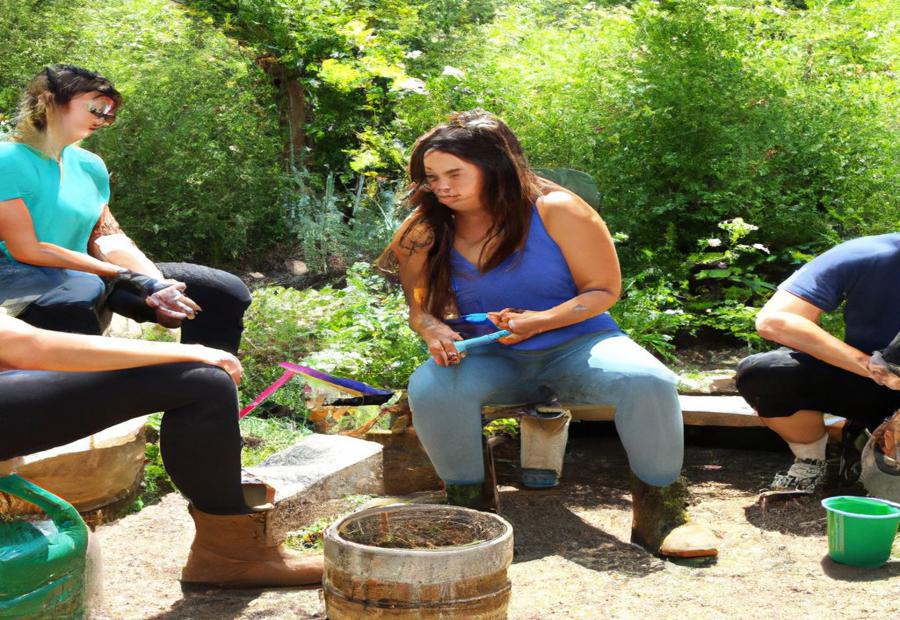
Photo Credits: Gardeninggurus.Org by Russell Robinson
Garden City Harvest Workshops offer a range of engaging opportunities for both cooking and gardening enthusiasts. From kitchen workshops to garden workshops, these sessions provide practical knowledge and valuable insights. With a diverse schedule and accessible pricing options, these workshops aim to empower individuals with the skills needed to create their own thriving gardens and prepare delicious meals using fresh produce. Join us to learn and grow in the world of seasonal garden education.
Overview of workshops on cooking and gardening
Cooking and gardening workshops are an educational experience. They let participants gain knowledge and try their hands at sustainable food practices and organic produce. The aim is to educate and empower, as well as engage and protect the environment.
Workshops let participants develop sustainable food practices and organic produce. They learn practical knowledge and have hands-on experience. Plus, they learn about soil fertility, garden health, handling of growing seasons, and reducing waste in food consumption.
These workshops have sliding scale pricing options and workshop schedules throughout the year. This helps people of all backgrounds attend. They acquire valuable skills, understand sustainable food practices, and connect with other people who share interests in healthy eating and environmental conservation.
Kitchen workshops
Garden City Harvest’s kitchen workshops provide a unique opportunity to learn how to make the most out of locally sourced ingredients. With sliding scale pricing options, these workshops allow for individuals of all backgrounds to participate. Topics covered include soil fertility, improving garden health, and other essential techniques for growing sustainable and organic food.
Attendees at these workshops will gain guidance on handling Montana’s unique growing season, with the aim of maximizing the potential of their gardens. The workshops also allow individuals to enhance their culinary skills in a sustainable way, inspiring them to become more involved in cultivating and enjoying fresh, locally grown produce.
Garden workshops
At these garden workshops, folks can gain knowledge about composting, vermicomposting, and tiny garden design/installation. They’ll also get to taste-test harvests and do art projects involving plant parts. Plus, seasonal crop planting will help participants understand the importance of customizing garden activities. Additionally, aromatherapy sessions and botanical herb tea demos offer a special experience for those wanting natural remedies in their lives.
It’s important to note that each workshop is unique. For example, some may focus on scavenger hunts or nature journaling. Others may involve seed saving or creating group project garden murals. Whoever attends, they can expect to gain valuable skills and knowledge related to gardening and sustainable practices.
Pro Tip: To get the most out of your garden workshop experience, come with questions and an open mind. Enjoy the hands-on activities. And don’t be afraid to ask the experts for help.
Workshop schedule and availability
Garden City Harvest offers a comprehensive list of workshops focusing on cooking and gardening. These include topics such as sustainable and organic food, soil fertility, and garden health. The workshop schedule is designed to suit different preferences and schedules. To help individuals choose, a table can be created with details such as name, date, time, location, and pricing.
Also, Garden City Harvest offers kitchen workshops to teach about minimizing food waste and maximizing local resources. Other workshops are available for those interested in composting, vermicomposting, nature journaling, and aromatherapy using botanical herb teas.
Pro Tip: Check the workshop schedule regularly as new workshops may be added throughout the season. Early registration is advised due to limited availability for some sessions.
Gardening workshops to make it accessible to all!
Sliding scale pricing to ensure accessibility
Sliding scale pricing is an option for all financial backgrounds. It lets people pay based on their income or what they can afford. Organizations can reach a wider audience with a range of prices, so those who normally couldn’t afford it can join in.
This pricing system gives people with limited funds a chance to take part in seasonal gardening education. It removes barriers and encourages inclusivity. It also acknowledges different financial situations, making it more equitable.
You can gain knowledge about seasonal gardening at a price tailored to your needs. Take the first step towards becoming involved in seasonal gardening today! Don’t miss out on this opportunity. Join us in creating vibrant gardens and promoting sustainable practices while supporting your local community.
Conclusion
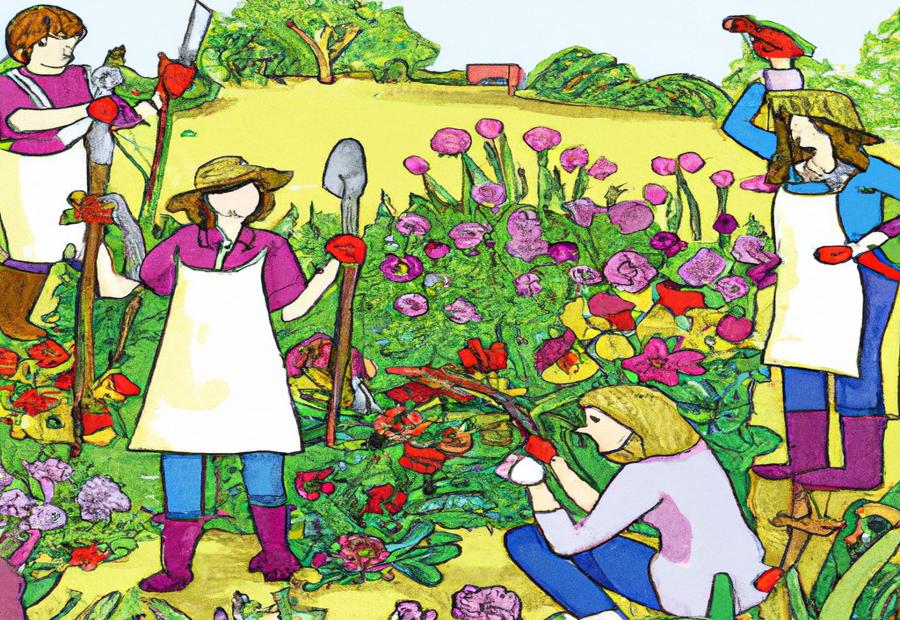
Photo Credits: Gardeninggurus.Org by Stephen Clark
Seasonal garden education and workshops offer a great chance to those interested in gardening to increase their knowledge and abilities. Topics include soil preparation, seed sowing, plant propagation, pest control, and harvest practices. By attending these sessions, participants can learn about various plants, gardening techniques, and how to maintain a garden throughout the seasons.
One of the benefits is the chance to communicate with similar people in a favorable environment. Garden fanatics can ask questions, gain practical skills, and link up with other gardening enthusiasts who share the same enthusiasm for this hobby. The community part of the workshops encourages collaboration and inspiration, allowing people to learn from each other and form a network of fellow gardeners.
Furthermore, the workshops also focus on sustainable gardening practices. Participants learn how to lessen their environmental effect while still enjoying their gardening activities. This focus on sustainability is vital for the long-term health of our environment.
Some Facts About Seasonal Garden Education And Workshops:
- ✅ Online Learning – Seasonal Gardening Activities Training Programme is available at https://learning.trellisscotland.org.uk/ (Source: Team Research)
- ✅ The EarthBites team offers workshops for schools and community groups to learn about urban gardening and nutrition. (Source: EarthBites)
- ✅ The Royal Horticultural Society (RHS) offers reduced ticket prices for events, free access to RHS Gardens, and reduced prices on RHS Garden courses and workshops for members. (Source: RHS)
- ✅ Julie Hansen, an early childhood educator with 24 years of experience, offers ECE workshops on exploring seasonal gardening. (Source: Julie Hansen)
- ✅ Garden City Harvest offers workshops on cooking and gardening, focusing on making local food a staple in participants’ homes. (Source: Garden City Harvest)
FAQs about Seasonal Garden Education And Workshops
What are some examples of outdoor learning spaces in seasonal gardening?
Some examples of outdoor learning spaces in seasonal gardening include ground-level gardens, raised-bed gardens, container gardens, green roof gardens, vertical gardens, bird and butterfly gardens, and sensory gardens. These spaces provide opportunities for hands-on learning experiences and engage the senses.
How can gardening activities be adapted to meet the needs of different individuals?
Gardening activities can be adapted to meet the needs of different individuals by considering their specific space and requirements. For example, vegetable patches can be incorporated into outdoor spaces, and indoor planting using recycled materials can be done in limited spaces. Additionally, sensory gardens can be created to stimulate reminiscence, conversation, and engage the senses.
How can I get involved in leading gardening activities?
To get involved in leading gardening activities, you can enroll in online training programmes or workshops that provide a practical introduction to seasonal gardening. No prior gardening knowledge is required, and these programmes empower participants to organize and lead gardening activities with confidence. You can also join a gardening charity or community group that offers opportunities to learn and engage in urban gardening.
What are the benefits and outcomes of participating in seasonal gardening workshops?
Participating in seasonal gardening workshops has numerous benefits and outcomes. They support physical activity, social interaction, and sensory stimulation, which contribute to a sense of well-being. The workshops also offer opportunities to learn new skills, revive old skills, and demonstrate care for others. Additionally, participants can gain confidence in their ability to grow food, preserve harvests, and enhance garden spaces.
How can I find further information about the seasonal gardening workshops mentioned?
To find further information about the seasonal gardening workshops mentioned, you can visit the respective websites provided in the reference data. Each source provides details on workshop topics, schedules, pricing, and registration processes. You can also contact the course creators or workshop organizers directly for any specific inquiries.
Are there any gardening resources available for educators interested in creating program gardens?
Yes, there are gardening resources available for educators interested in creating program gardens. The mentioned workshops and training programmes provide educators with practical knowledge and tips for planning, planting, and maintaining school gardens throughout the seasons. These resources also offer ideas for incorporating gardening into early learning settings and provide support for educators with varying levels of gardening experience.


